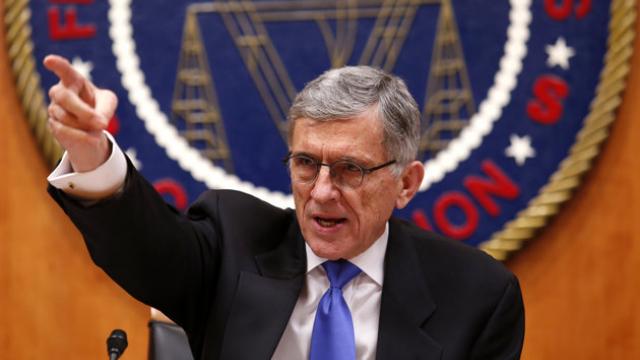
In a long-awaited decision, a federal appeals court on Tuesday upheld the Obama administration’s net neutrality rules, dealing a punishing blow to telecom and cable companies that have sought to overturn the regulations.
Characterizing the government’s net neutrality effort as an “attempt to achieve internet openness” and “the principle that broadband providers must treat all internet traffic the same regardless of source,” the U.S. Court of Appeals for the D.C. Circuit concluded that the rules are authorized under current law.
The Obama administration’s rules prevent internet service providers, or ISPs, from charging content producers for faster or more reliable service, a practice known as “paid prioritization.” The rules also ban blocking and purposefully slowing the traffic of lawful services, and apply to both mobile and fixed broadband service.
Taking each of these proposals in turn, the appeals court looked at how they fit with within the legal framework Congress has given the Federal Communications Commission to set the rules for internet service over the years — from dial-up to DSL to cable modem service — and determined that it was within the FCC’s power to reclassify broadband service in its various forms as “telecommunications service” for regulatory purposes.
Tom Wheeler, the chairman of the FCC, praised the ruling in a statement.
“Today’s ruling is a victory for consumers and innovators who deserve unfettered access to the entire web, and it ensures the internet remains a platform for unparalleled innovation, free expression and economic growth,” he said.
For years, activists, businesses, politicians and regulators have debated how ISPs should be treated. The ISPs want less regulation so they have more freedom to choose how they manage their services. President Barack Obama and major tech companies have argued they should be treated more like legacy phone companies, which cannot unjustly discriminate when providing services.
The current legal spat is an extension of that dispute. Last year, the FCC voted 3-2 to reclassify broadband internet service as a utility under a 1934 law called the Communications Act, which originally aimed to ensure that customers would have access to universal radio and wire service at a reasonable price.
This didn’t mean ISPs would be treated the same as old-school utility companies — they have their own unique rules — but defining them this way gave the FCC broader powers to regulate them. The agency used this authority to enact the net neutrality rules.
AT&T and cable and wireless trade groups sued the agency last year, arguing that the FCC had overstepped. They argued the Communications Act, which provided legal backing for the new rules, is a sweeping, outdated framework that was never intended to be used this way. Providers have repeatedly said that they support net neutrality, but believe it can be accomplished under a lighter regulatory regime.
But the FCC already tried using a lighter touch with net neutrality rules. In 2010, it adopted an order that drew authority from a section of the Telecommunications Act of 1996, a law meant to promote investment and competition. Verizon sued the FCC in 2011 to overturn the rules, and the same appeals court agreed that the FCC did not have solid legal footing, even as it upheld the commission’s power to promulgate open internet rules.
The agency went back to the drawing board and — after receiving more than 4 million comments from the public, advocates and business actors — came up with its new approach, which is how broadband providers ended up with rules they disliked even more. (Verizon is now the parent company of The Huffington Post.)
Critically, the D.C. Circuit on Tuesday rejected each and every one of the arguments advanced by the telecoms and broadband providers against the new rules — including a shot-in-the-dark First Amendment argument that sought to cast the regulation as an impermissible infringement on the companies’ speech.
“Because a broadband provider does not — and is not understood by users to — ‘speak’ when providing neutral access to internet content as common carriage, the First Amendment poses no bar to the open internet rules,” the court said.
One member of the three-judge D.C. Circuit panel, U.S. Circuit Judge Stephen Williams, agreed with much of the ruling, but ultimately would have invalidated the FCC rules because the agency didn’t engage in “reasoned decisionmaking” when formulating them. Williams said the administration was expressing a “change of policy by only the barest of threads.”
The wonky issue of net neutrality became highly politicized last year, when Republicans, telecom and cable companies faced off against Obama, big-name tech companies, comedian John Oliver and most of the American public.
Critics have argued that the rules are too burdensome and that regulating broadband under regulations developed for monopoly telephone service will hurt investment. (Some companies have contradicted themselves on that point, admitting that probably won’t be the case.)
Net neutrality defenders, including the Internet Association, a trade group that represents Google, Facebook, Twitter and other tech companies, argue that without strong rules, ISPs could differentiate content access, turning the Internet into a closed delivery system like cable TV.
Progressive advocates say strong net neutrality rules that extend to wireless service are also important because they protect disenfranchised communities that tend to rely on these networks, as well as small startups, bloggers and civil rights activists.
“We cannot have a two-tiered Internet with fast lanes that speed the traffic of the privileged and leave the rest of us lagging,” FCC Commissioner Jessica Rosenworcel said when she voted for the rules last year.
The case could also still be appealed to the Supreme Court. But as The Washington Post’s Brian Fung pointed out, as long as the late Justice Antonin Scalia’s seat remains vacant, the likelihood of a split decision will mean the lower court’s ruling will stand. Or the justices may choose not to touch the issue until Scalia’s replacement is confirmed.
On that front, the National Cable & Telecommunications Association, one of the trade groups that lost with Tuesday’s decision, didn’t yet say whether it will ask the Supreme Court to review the case. It nonetheless urged congressional action.
“While this is unlikely the last step in this decade-long debate over Internet regulation, we urge bipartisan leaders in Congress to renew their efforts to craft meaningful legislation that can end ongoing uncertainty, promote network investment, and protect consumers,” the NCTA said in a statement.
AT&T, for its part, seemed confident about its chances before a short-staffed bench.
“We have always expected this issue to be decided by the Supreme Court, and we look forward to participating in that appeal,” David McAtee, the company’s general counsel, said in a statement.
Though the ruling is a victory for the government and consumer advocates, other big winners include “edge providers” — companies such as Netflix and Google that depend on third parties’ broadband services to drive their product offerings.
In a prior ruling, one of three touching on the legality of regulating broadband services, the D.C. Circuit said these businesses are part of the “virtuous circle” that leads to increased innovation and investment. They, too, were giddy with Tuesday’s watershed result.
“The third time was the charm,” Pantelis Michalopoulos, a lawyer who argued in favor of the net neutrality rules on behalf of Netflix and other intervenors, said in a statement. “The open Internet rules are here to stay.”
3 WAYS TO SHOW YOUR SUPPORT
- Log in to post comments












